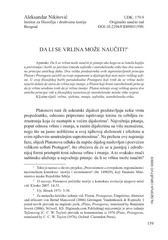Da li se vrlina može naučiti?
Can Virtue be taught?
Апстракт
The teachability of virtue is an issue on which were crossed swords during the struggle for supremacy between two basic principles of ancient Greek spirit –
sophistry and ancient Greek ethics. Two great representatives of these opposite principles, Plato and Protagoras, confronted their arguments in Plato’s dialog named after the great sophist. Paradoxically, during this philosophical struggle, Protagoras, who at the beginning supposed that virtue is teachable, later, on the contrary, states that virtue is not knowledge, and this would make it least likely to be teachable. On the other hand, Plato, who is trying to preserve the ancient Greek principle that virtue is innate, claims that virtue is knowledge. The solution of this great dispute between two principles of antiquity Plato sees in philosophical theoretization of ancient Greek mythical worldview.
Кључне речи:
virtue (arete) / art (techne) / sophistry / starohelenska etikaИзвор:
Filozofija i društvo/Philosophy and Society, 2009, 159-183Издавач:
- Beograd : Institut za filozofiju i društvenu teoriju
Финансирање / пројекти:
- Просвећеност у европском, регионалном и националном контексту: историја и савременост (RS-MESTD-MPN2006-2010-149029)
Институција/група
IFDTTY - JOUR AU - Nikotović, Aleksandar PY - 2009 UR - http://rifdt.instifdt.bg.ac.rs/123456789/443 AB - The teachability of virtue is an issue on which were crossed swords during the struggle for supremacy between two basic principles of ancient Greek spirit – sophistry and ancient Greek ethics. Two great representatives of these opposite principles, Plato and Protagoras, confronted their arguments in Plato’s dialog named after the great sophist. Paradoxically, during this philosophical struggle, Protagoras, who at the beginning supposed that virtue is teachable, later, on the contrary, states that virtue is not knowledge, and this would make it least likely to be teachable. On the other hand, Plato, who is trying to preserve the ancient Greek principle that virtue is innate, claims that virtue is knowledge. The solution of this great dispute between two principles of antiquity Plato sees in philosophical theoretization of ancient Greek mythical worldview. PB - Beograd : Institut za filozofiju i društvenu teoriju T2 - Filozofija i društvo/Philosophy and Society T1 - Da li se vrlina može naučiti? T1 - Can Virtue be taught? SP - 159 EP - 183 DO - 10.2298/FID0903159N ER -
@article{
author = "Nikotović, Aleksandar",
year = "2009",
abstract = "The teachability of virtue is an issue on which were crossed swords during the struggle for supremacy between two basic principles of ancient Greek spirit –
sophistry and ancient Greek ethics. Two great representatives of these opposite principles, Plato and Protagoras, confronted their arguments in Plato’s dialog named after the great sophist. Paradoxically, during this philosophical struggle, Protagoras, who at the beginning supposed that virtue is teachable, later, on the contrary, states that virtue is not knowledge, and this would make it least likely to be teachable. On the other hand, Plato, who is trying to preserve the ancient Greek principle that virtue is innate, claims that virtue is knowledge. The solution of this great dispute between two principles of antiquity Plato sees in philosophical theoretization of ancient Greek mythical worldview.",
publisher = "Beograd : Institut za filozofiju i društvenu teoriju",
journal = "Filozofija i društvo/Philosophy and Society",
title = "Da li se vrlina može naučiti?, Can Virtue be taught?",
pages = "159-183",
doi = "10.2298/FID0903159N"
}
Nikotović, A.. (2009). Da li se vrlina može naučiti?. in Filozofija i društvo/Philosophy and Society Beograd : Institut za filozofiju i društvenu teoriju., 159-183. https://doi.org/10.2298/FID0903159N
Nikotović A. Da li se vrlina može naučiti?. in Filozofija i društvo/Philosophy and Society. 2009;:159-183. doi:10.2298/FID0903159N .
Nikotović, Aleksandar, "Da li se vrlina može naučiti?" in Filozofija i društvo/Philosophy and Society (2009):159-183, https://doi.org/10.2298/FID0903159N . .


